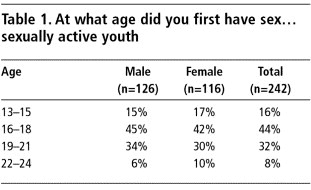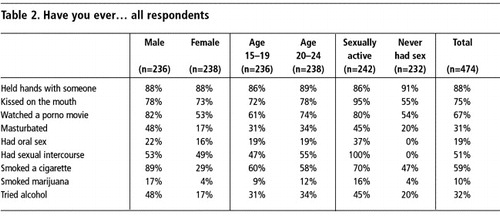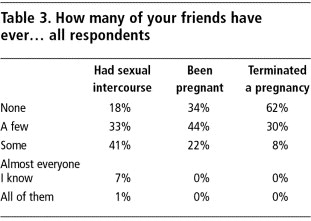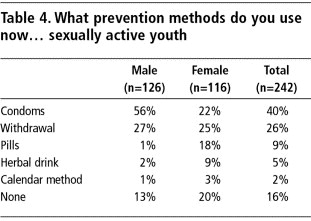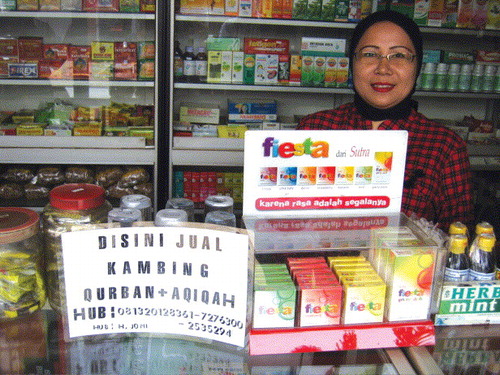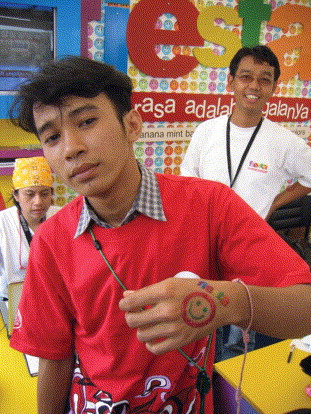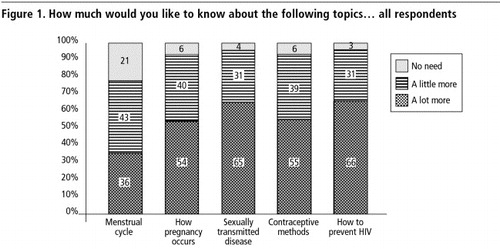Abstract
DKT Indonesia, a social marketing enterprise, undertook research among young people in Indonesia to develop a strategy to heighten understanding of safer sex and increase the availability and use of condoms among sexually active youth. The centerpiece of this campaign was the launch in 2003 of Fiesta condoms, with a range of flavours, colours, shapes and pricing aimed to appeal to young people. Working with key commercial and NGO partners, distribution has focused on places where young people often congregate and shop. The campaign relies heavily on the media, including TV commercials, radio talk shows, print media and mobile text messaging. DKT has also partnered with MTV, the Staying Alive campaign and other NGO and private sector partners to educate young people on a range of reproductive and sexual health issues. Based on retail audits and focus group discussions, the Fiesta brand has been a success. In three years, it has gained a 10% share of the condom market and helped to increase overall condom sales by 22%. Young people identify Fiesta as “their” brand and have started to use Fiesta condoms in significant numbers.
Résumé
DKT Indonesia, entreprise de marketing social, a mené une recherche auprès de jeunes en Indonésie afin de définir une stratégie d’information sur les relations sexuelles protégées et d’accroître la disponibilité et l’utilisation de préservatifs chez les jeunes sexuellement actifs. Le point fort de cette campagne a été le lancement, en 2003, des préservatifs Fiesta, avec une gamme de parfums, couleurs, formes et prix ciblant les jeunes. En collaboration avec des partenaires commerciaux et des ONG, la distribution s’est centrée sur les magasins et lieux de rencontre des jeunes. La campagne fait beaucoup appel aux médias, avec des spots à la télévision, des débats radiophoniques, des articles de presse et des messages sur les téléphones portables. DKT s’est également associée avec MTV et la campagne « Staying Alive », des ONG et d’autres partenaires du secteur privé pour informer les jeunes de questions de santé génésique. D’après les enquêtes auprès des détaillants et les discussions de groupe, la marque Fiesta a été un succès. En trois ans, elle a obtenu 10% de parts de marché et a aidé à relever de 22% les ventes globales de préservatifs. Les jeunes identifient Fiesta comme « leur » marque et ont commencé à utiliser les préservatifs en quantité importante.
Resumen
DKT Indonesia, una empresa de mercadeo social, emprendió investigaciones entre los jóvenes de Indonesia para elaborar una estrategia con el fin de mejorar el entendimiento del sexo más seguro y aumentar la disponibilidad y el uso de los condones entre la juventud sexualmente activa. El eje de esta campaña fue el lanzamiento en 2003 de los condones Fiesta, con una variedad de sabores, colores, formas y precios destinados a atraer a la juventud. Con la participación de colaboradores comerciales y ONG clave, la distribución se ha centrado en lugares donde los jóvenes suelen congregarse e ir de compras. La campaña depende mucho de los medios de comunicación, como los avisos de TV, programas de radio en los que el público participa por teléfono, material impreso y mensajes textuales por móvil. DKT también se ha asociado con MTV, la campaña “Staying Alive” y otras ONG y colegas del sector privado para educar a los jóvenes sobre la salud sexual y reproductiva. En tres años, la marca Fiesta se ha ganado el 10% del mercado de condones y ha ayudado a aumentar las ventas de condones en un 22%. Los jóvenes identifican a Fiesta como “su” marca y han empezado a usar Fiesta en números considerables.
Key Words:
Indonesia is the fourth most populous country in the world with a population under the age of 15 of approximately 70 million. Indonesia is also home to more than 200 million Muslims, or one in eight of the world’s Muslim population, and is experiencing a period of immense economic and social change. As Indonesians become increasingly aware of and exposed to Western values and behaviours through globalised media, so are they increasingly confronted by religious politicisation. Although Indonesia is a traditional society, it is in the process of embracing both conservative and liberal sub-cultures, often with conflict but often apparently unnoticed as well. Islamic Shari’a law operates in northern Sumatra while on the beaches of Bali, tourists and Indonesians dance the night away to disco music.
As such, urban Indonesia, like many places in the developing world, is an environment where the values and behaviours of the younger generation are pushing up against the traditional systems and expectations of their parents and elders. Anecdotal evidence has long suggested that many young people are sexually active and have access to an increasingly wide range of resources and information on sex. A DKT review of youth media, radio stations and television programmes revealed that sex and relationships form a major part of the content and interest value. Similarly, Holzner and Oetomo cite numerous examples of sexually active Indonesian youth and their desire for information.Citation1
DKT Indonesia is a non-profit social marketing enterprise dedicated to the marketing and distribution of high-quality contraceptives and condoms for family planning and HIV/AIDS prevention. DKT has operated in Indonesia since 1996 with funding from the German government through Kreditanstalt für Wiederaufbau (KfW), the German Development Bank and the Bill and Melinda Gates Foundation. DKT started working in Indonesia as evidence suggested that condom use needed to be increased.Citation2 In 2000, DKT expanded operations into the family planning sector, marketing a full range of contraceptives.
Understanding young people: DKT’s research base
DKT has undertaken a number of research studies during the past ten years and collected additional anecdotal information regarding sexual behaviour.Citation3Citation4 These studies have included behaviour change surveys, condom user profiling, intercept studies that ask consumers on-the-spot questions about purchasing habits and focus groups to monitor marketing strategies. These have included youth but were not focused solely on them. Based on international experience as well as partnerships with Indonesian youth-oriented NGOs and partners, DKT believed that young people were not well understood.
In an effort to improve this knowledge base, DKT commissioned a study of the sexual behaviour of unmarried youth in four major cities (Jakarta, Surabaya, Medan and Bandung) in Indonesia. The study was undertaken by Synovate, a private research company; 474 respondents aged 15–24 were interviewed in November 2004.Citation5 The respondents were half young men and half young women and equally distributed between high-and low-income groups, which was determined by interview locale. A random intercept recruitment technique was employed in target locations (malls, near schools) and face-to-face interviews were conducted. No effort was made to select for sexual orientation. A person of the same sex as the respondent conducted the interviews. Respondents chose a private location where they felt comfortable answering sensitive questions, including questions about their own sexual behaviour. Self-completion of answers and indirect questioning, such as asking about the behaviour of friends, were used as tools for very sensitive topics.
Responses from those who were sexually active were compared to those who were not, as regards behaviour, knowledge and attitudes. This was a small sample and not necessarily representative of the overall population. However, it provided valuable information concerning sexual behaviour, contraceptive and condom use and risk of sexually transmitted diseases, including HIV/AIDS.
The average age of sexual debut reported was 18 years, with 16% of respondents reporting first sex between ages 13–15 (Table 1)
The finding that 89% of all respondents thought sex before marriage was “against my values and religion” while 51% had had sexual intercourse before marriage (Table 2) signified a conflict between values and actions.Knowledge levels on reproductive health issues generally were moderate, with 70–80% of respondents claiming to have sufficient information on a variety of subjects. Their main sources of information on sexual health were friends (35%) and pornographic films (22%) (Table 2). School and television accounted for only 5% each, while government, religious figures, parents and other family members were hardly mentioned at all. 67% of all respondents reported having watched a pornographic film, with few differences according to socio-economic status or age.
A large majority had at least a few friends who had had intercourse, two-thirds knew someone who had been pregnant and 38% knew someone who had terminated a pregnancy (Table 3).
Sex was often not planned; 66% of those who had had sex said it “just happened”, which contributed to low rates of initial contraceptive or condom use. However, 40% of sexually active respondents reported using condoms as their current prevention method, followed by withdrawal (26%) and pills (9%) (Table 4).Respondents reported that fun and “cool” activities included watching TV, going out on a date, going to the mall, listening to music and hanging out with friends. 90% of respondents reported watching TV everyday, with music (74%) most often being watched.
Sexually active and non-sexually active youth were equally aware of modern contraceptive methods and knew where to obtain them. There were also very few differences in knowledge levels about sex, pregnancy, sexually transmitted infections (STIs) and HIV/AIDS between those who were sexually active and those who were not. These findings are significant as they demonstrate that access to information on sex and sexual health was not a determinant in sexual activity.
Most of the respondents expressed interest in having more information on a variety of subjects ()
DKT’s response: an integrated campaign for youth
DKT sought to address these issues by initiating a youth-oriented educational campaign in 2003. DKT believed that sexual activity and curiosity among Indonesian youth was clearly evident but that accurate information about reproductive health issues, including prevention of pregnancy and STIs was severely lacking. DKT’s campaign was designed to heighten awareness and understanding on a range of issues related to safer sex and to increase availability and use of condoms among sexually active youth.
The centerpiece of this campaign was the launch of the “Fiesta” brand of condom targeted to youth and a multi-media branding designed to affect behaviour. The strategy was to utilise the Fiesta condom campaign as the vehicle through which to provide information on a range of issues. To be effective, the campaign needed to be highly focused with clear messages that spoke to the concerns and needs of young people, without sounding “preachy”. At the same time, to keep the attention of youth, it needed to be “cool” and fun. A key theme was therefore that “Safety Can Be Fun”.
Other key issues raised by the research were the importance of pregnancy prevention in addition to HIV prevention and addressing engrained myths such as that antibiotics used against some STIs are also effective against HIV.
Fiesta condoms: the right product
Quality is a key condom attribute in determining consumer choice. Fiesta condoms were designed with youth in mind. The condoms are colorful and connote the concept of fun and come in a range of flavours, colours and shapes. We consciously chose an international name (the word “fiesta” is commonly known in Indonesia) and used English throughout the packaging (instructions are also in Indonesian) to build an international image. English also helped solidify the product image as being imported, an important and positive distinction among Indonesian consumers – even those who do not speak English. Pricing was set generally towards the middle of the Indonesian market, with some price differentiation, depending on the product variant.
At the time of Fiesta’s introduction, the Indonesian condom market was already a vibrant and active one,Citation6 with four other primary brands and more than 40 sub-brands available in a range of prices. However, there was no condom positioned for youth.
The campaign was initiated in December 2002 with strawberry (red), mint (green) and banana (yellow) condoms in three-piece packets, as well as a 12-piece ‘Party Pack’. In May 2003, we introduced the flavor of durian (orange), a popular Southeast Asian fruit notorious for its stench. This was particularly useful because it was considered humorous. The ability to make people laugh when talking about condoms served to break the ice during educational events and also reduced the stigma around condoms. (The Fiesta Durian condom has continued to sell well and has spurred two competitors to launch durian-flavoured variants as well).
Also in May 2003, we launched the “baggy” condom (with an extra-large head) and the Ultra-Safe condom with nonoxynol-9 spermicide.Footnote* In 2004 and 2005, we added three new condoms: multi-coloured, studded/dotted and a super-thin variant. The wide variety available contributed to a sense that Fiesta condoms were innovative and new. In addition, a full condom range allowed DKT to respond appropriately to concerns that condoms were smelly, led to lack of pleasure, were too thick or did not prevent pregnancy – issues that had been identified by consumers over the years in focus group discussions and behaviour surveys.
Distribution strategies
Bi-monthly retail audits and other research by the firm AC Nielsen regarding youth purchasing patterns found that mini-markets were increasingly becoming the main outlets for condom purchases. We therefore targeted small mini-markets and super-markets, many of which are open 24 hours a day, have both male and female cashiers and provide the anonymity desired by young people. In contrast, pharmacies and drugstores are typically operated by families and employ only young women as cashiers, potentially causing embarrassment.
As another way of reaching out to youth, we worked in partnership with Circle K, a popular 24-hour convenience store with branches in a number of large urban centres, to develop a small poster and brochure for an educational campaign in their outlets. The condoms are prominently displayed and the brochures highlight safer sex issues. In addition, Circle K’s cashiers were trained to hand out the brochures to young people, especially those who were buying condoms.
DKT also opened up new outlets for condoms in bars, cafés and clubs where young people often spend their free time. With a mapping of outlets, DKT sales teams negotiated with outlet owners to make condoms available, explaining the importance of reproductive and sexual health but also focusing on the financial incentives and benefits they would gain by carrying and selling these products. These negotiations required a good deal of time and energy as these outlets were not used to the idea of making condoms available on their premises.
Because buying condoms is often considered an embarrassing experience for youth (let alone adults), we invested resources in ensuring high product visibility and availability. This included merchandising campaigns and display contests in key shops so that Fiesta condoms were highlighted on the shelves. We also developed a special on-the counter display for condoms highlighting condom availability, thereby making it easier for consumers to ask for or simply pick up condoms.
The media: key to general awareness
Mass media have been central to the Fiesta campaign. From the beginning, we launched a massive educational effort, utilising TV, radio and print. We commissioned MACS 909, an Indonesian advertising agency, to produce and place in the media eight 15-second animated TV commercials to promote the different Fiesta brands and attributes. One such commercial depicted a motorcycle helmet falling in love with a strawberry and them blending together to become a Strawberry Fiesta condom (helmets are widely understood to represent condoms in Indonesia). Building on the strawberry–helmet theme, similar ads used mint and a shield, banana and a sarong, and durian and an umbrella. Another used the idea of a slot machine (dubbed a “Fun Machine”) where the Baggy, Ultra-Safe, Ultra-Thin, and Dotted condoms were the prizes won. These commercials, focused on the theme of “Safety Can Be Fun”, were widely aired on national TV and served to jump-start the campaign.
DKT also developed a series of radio programmes sponsored by Fiesta with support from the Australian government. Working with 20 radio stations throughout the country over a period of three months, DKT developed sexual health programming to reach young people. The programmes covered a wide range of topics, including pregnancy, STIs, contraceptive methods and ways to prevent HIV infection as well as relationship tips and answers to questions about sex, such as orgasm and masturbation. The programmes were tailored by each radio station using local language and a style that was considered most effective to reach young people. By coordinating with well-known radio personalities, key messages on safer sex and condom use were mingled with much-desired information on sex and communicated widely without sounding “preachy”. Our assumption was that most youth, whether sexually active or not, and regardless of sexual orientation, would be interested in this information.
Print media have similarly been an important instrument for reaching youth. In magazines targeting young men, we have placed advertisements emphasising key messages and highlighting product features. More than 250,000 condom samples were affixed to magazines such as Men’s Health, Popular and Maxim, giving readers a chance to see (and try) a Fiesta condom.
Partnership with MTV
Central to the campaign was a partnership that DKT established with MTV Indonesia, in which DKT sponsored a number of MTV events, including the search for a music Video Jockey (VJ) and, for two years consecutively, the MTV “Stayin’ Alive” campaigns. Through close collaboration and discussion, these activities formed a cornerstone of the Fiesta campaign.
The partnership started with a variety of educational and outreach efforts. These included TV vignettes that addressed topics such as discrimination towards people living with HIV, how to prevent HIV and issues facing intravenous drug users. In addition, DKT and MTV enlisted popular Indonesian musicians to speak out on HIV issues, including condoms, using youth-relevant language to communicate core messages. These vignettes and celebrity spots were widely aired on MTV and were immensely popular. One such vignette highlighted the lead singer from the top-rated Indonesian band Peter Pan, who informed listeners that “90% of people infected with HIV don’t know they are infected” and added “Think about it guys”.
Text messaging campaign
In order to further personalise the educational outreach, DKT and MTV executed an information campaign through mobile text messaging. MTV viewers were encouraged to text in their name and address. DKT then sent out a safer sex packet with information on HIV/AIDS and pregnancy prevention and other branded items. Condoms were not included as there were concerns that they might reach under-age youth, thereby creating a public relations problem. More than 10,000 young people sent text messages to MTV and received the safer sex kits.
The success of this experiment has further prompted us to initiate a text-message education service independently, whereby subscribers are sent safer sex tips and information on a range of reproductive health issues each day. Examples include messages such as:
“STI is short for sexually transmitted infection. STIs can include herpes, gonorrhoea, syphilis and HIV. STIs are transmitted primarily through unsafe sex (sex with many partners and without a condom).”
“Guys, how often do you fantasise about sex? Men usually fantasise more about sex than women. But this energy can also be channeled into sports. Get your friends and girlfriend to work out with you today. It’s healthy, positive and fun.”
Fiesta: making safety fun
In line with the “Safety Can be Fun” theme, DKT developed a full range of activities and materials that were indeed fun. For example, to associate the Fiesta condom and condom use in general with youth-oriented culture, we partnered with the music bar, Hard Rock Café, providing free condom samples and sponsoring music events that incorporate safe sex messages. Similarly, DKT worked with Vodka Cruiser, a multi-coloured Vodka drink popular among young people. In bars and cafés where young people congregate, we developed a mini-brochure that was attached to each bottle sold and contained a sample condom and safer sex facts.
DKT has also supported a wide range of outreach and educational activities in partnership with hundreds of local Indonesian non-governmental organisations (NGOs) focused on HIV prevention, many of which focus on youth. Activities have included face-to-face education in the Blok M mall over the weekend with the NGO Yayasan Pelita Ilmu and “Condom Day” activities at the campuses of the University of Indonesia, Jaya Baya University and Sahid University coordinated by student youth groups. Together with the international movement “Dance for Life”, DKT worked with the youth campaign which utilises dance as a means to educate youth in schools and elsewhere.
Youth-friendly promotional and educational materials with the “Safety Can Be Fun” message have also been developed and widely distributed. These include stickers, posters, calendar, t-shirts, baseball hats, key chains, beer coasters and condom smiley pins.
Fiesta campaign results
In three years, the Fiesta brand has become the “youth” condom brand in Indonesia, gaining more than 10% of the market share overall and driving growth in the marketplace. AC Nielsen’s retail audits have documented this growth, providing evidence of Fiesta’s success in driving the market upwards by 22%. DKT’s condom sales have increased – especially in those outlets that have targeted youth.
In 2006 we conducted a series of focus group discussions (FGDs) with young and older condom users, again carried out by Synovate, the independent research firm used earlier. The research further documented the strong brand image that Fiesta condoms now enjoy among the younger age group as an important marker of acceptance of condoms and condom use. These FGDs found that Fiesta was the first brand recalled when participants were asked about condom brands, and that it was widely regarded as a fun, alive and high quality brand.
Although three years is a relatively short time in the life of a new brand or a social marketing campaign, there has been a clear and demonstrated impact of the Fiesta brand and campaign among youth in Indonesia. Young people identify Fiesta as “their” brand and have started to use Fiesta condoms in significant numbers.
The future: keeping safety fun
In order to keep reproductive health issues front and centre in the minds of Indonesia’s youth, the Fiesta campaign must remain dynamic. Future plans include the introduction of additional flavours and variants as well as a Fiesta female condom. DKT will continue to explore adventurous and exciting strategies to ensure that young Indonesians are accessing the information and products they need to lead healthy lives.
Acknowledgements
A version of this paper was presented at Condoms: An International Workshop, London, 21–23 June 2006. The author gratefully acknowledges the assistance of Toto Budiono, Pierre Frederick, and Aditya Anugrah Putra in gathering background information for this paper.
Notes
* The N-9 condom has since been taken off the market.
References
- BM Holzner, D Oetomo. Youth, sexuality and sex education messages in Indonesia: issues of desire and control. Reproductive Health Matters. 12(23): 2004; 40–49.
- DKT Indonesia Research Briefing: HIV/AIDS and Condoms - Knowledge, Attitudes, Practice Survey, September 1997.
- DKT Indonesia Research Briefing: HIV/AIDS and Condoms – A Behavior Change Survey, May 2001.
- DKT Indonesia Research Briefing: HIV/AIDS and Condoms – A Behavior Change Survey, April 2004.
- DKT Indonesia Research Briefing: Youth Sexual Behavior Study in Four Cities in Indonesia. March 2005.
- C Purdy. Analysis of the Indonesian Condom Market. 2002; DKT Indonesia: Jakarta.
